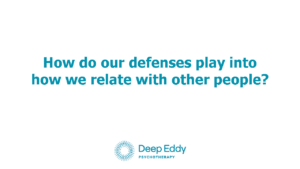Charlotte Howard, a therapist at Deep Eddy Psychotherapy in Austin, TX, talks about the simple defenses, how to identify our go-to defense, and what that looks like in relationship with others.
4 Simple Defenses in Therapy: Fight, Flight, Freeze, and Friendly
I really like the simple defenses of fight, flight, freeze, and friendly. You’ve probably heard of fight or flight and evolutionarily, of course, we had to fight off the animal that’s attacking or run like crazy— choosing what’s going to be the most effective at that moment. But there’s also freeze and friendly, which are also our animal defenses.
The Freeze Defense
Freeze would be freezing like a bunny or a deer if you get in danger. A lot of my clients actually do start to freeze up and they disappear. You might be the kind of person who just wants to disappear in a group, you don’t want anyone to notice you, or you don’t want to get called on. These people can actually disappear in their relationships and no one thinks about their needs anymore–it’s like they’re invisible. It does protect them, but of course, they lose everything.
It can also affect digestion. When we really get frozen and still in that way, we can have digestive problems and irritable bowel because things aren’t flowing and moving—we’re not moving enough. That’s the freeze defense.
The Friendly Defense
The other interesting fun defense is friendly. When the apes grimace at each other, which looks like a smile, it’s just to communicate, “I won’t hurt you if you don’t hurt me,” so it’s just a quick way to establish safety. It’s “smile—smile, okay we’re safe,” and that’s where our smiles evolved from.
Hopefully, now we can use those smiles to really communicate warmth and love and actually care for people, but smiling can also be defensive. Speaking can also be that way, as well. Sometimes you might see someone go on, “…and this happened to me and blah, blah, blah, blah…” and through this long conversation, you realize you did not connect. They used their words to actually keep you away instead of inviting connection.
The friendly defense is whether you are speaking to connect, or speaking to keep someone away. You can begin to notice in yourself the moments when you’re actually threatened and you really get overly friendly in a way that creates a wall. Everyone has their own style of defending. Some people get aggressive–that would be the fight. Some people avoid everything–that’s the fleeing. They may want to run out of the room.
So, when it comes to defenses, I like the basic ones because it can help you understand what your pattern is.
Once you identify what your defense is, how do you work with that?
Awareness of how your natural instinct to defend expresses itself will really help, first off. Then, working with a therapist to undo that defense, heal whatever is causing the sensation of threat, and to become more comfortable and safe in relationship and more comfortable being your authentic self is important. Between the different styles of defending, it’s really going to be somewhat the same in terms of the underlying process to take away the need for the defense, but in terms of actual defense the intervention would look different depending on what your pattern is. For instance, if you’re one of the fight people, you’d want to have other ways to deal with that impulse. You’d want to notice what’s happening and, through your therapy and healthy relationships, learn how to not always be creating arguments with people to keep them at a safe distance.
Is it ideal not to have any defenses?
Defenses have their place. We need to defend ourselves when we’re in danger, but a lot of times we’re not in actual danger the way our bodies respond. In our society, our body is probably not going to get attacked by a bear or a rhinoceros. People can hurt our hearts, but defending doesn’t usually help that.
We can have all our defenses up and if they say, “You’re an idiot,” it’s still going to hurt just as much. Unless we shut down completely—and that’s not really worth it. So in a way, a part of me wants to say, “Yes, no defenses are good,” but we need boundaries and, of course, you want to be able to give a message if you’re not being treated well. For the most part, however, our safety comes through our sense of self.
Is it possible to love yourself so much that nothing anyone ever said to you would shake you from that?
Even if you love yourself, we still care what other people think. That’s healthy because we’re social creatures and we wouldn’t be truly connected to other people if we didn’t care what they thought. We wouldn’t be truly connected if we didn’t care all about them, including their relationship with us, which includes how they feel towards us and what they think about us. But if you love yourself, you’re able to discern, “Oh, it’s sad that they don’t like me, but that doesn’t mean I’m bad. That’s just a loss because that would’ve been cool.” So you can shore yourself up–you don’t get lost in the idea that their world is your world.
Starting Therapy in Austin, TX
We would love to invite you to make a complimentary call to discuss some of your options and determine whether Deep Eddy Psychotherapy in Austin, TX is the right fit for you and your situation. Please contact us using the links below or in the sidebar and share this post or video if you found it to be valuable. Together we can create a world of well-being and joy.

